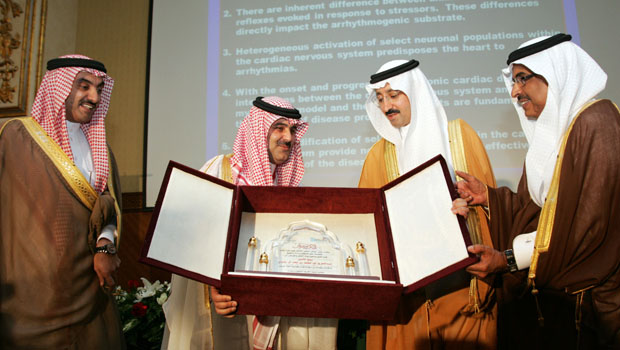“Despite major breakthroughs, cardiovascular disease continues to be the leading cause of death. It is also a major source of disability and seriously impairs the quality of life for family members and friends,” said Dr. Abdullah Abdulgader, director of the Al-Hasa-based Prince Sultan Cardiac Center, at the “King of Organs 2010” conference.
“Therefore, a new approach is needed and this conference will hear new ideas and new therapies and new approaches.”
Al-Hasa Gov. Prince Badr bin Mohammad bin Abdullah bin Jalawi opened the three-day international conference for heart specialists and surgeons in this historic Eastern Province city on Monday.
The governor said it was a moment of jubilation for Saudi Arabia to host such a galaxy of researchers. “Coming as it does just a few days after the 80th National Day celebrations, this international conference is proof of Saudi Arabia’s quest to learn from the world experts and to make them aware of Qur'anic concepts relating to the human heart,” he said.
“Some of these scholars have acknowledged all that has been said in the Holy Qur’an and Hadith about the various dimensions and aspects of what is now being described as the king of organs.”
The conference is the brainchild of Abdulgader, who said the heart is much more than a pump.
“It is a sensitive barometer of stress that senses environmental changes and responds to them via endocrine and electromagnetic signals to the brain and the rest of the body,” he said.
“We believe that the human body operates through a web of interconnected systems of body organs and internal and external environmental energy fields that interact in concert to create a coordinated universal symphony, in contrast to the current tunnel vision of isolated body organs and systems that act in an independent fashion.”
The conference, he said, is deliberating on various issues such as miracles of the Qur’an and the human heart, neuro-cardiology, genetics, genomics and cardio-genesis, cardiac dysmorphology, atherosclerotic coronary heart disease, neuro-modulation, congestive heart failure and hypertension, cardiac transplantation, behavioral cardiology and the Islamic perspective on genetic therapy.
“We are discussing issues that have not been discussed before. Remember, it is not easy to get these topnotch researchers to Saudi Arabia,” he added.
“But, Alhamdulillah, we managed to bring in the best. What we are calling for is global change. We are looking far ahead into the future. We are calling for changing the way we practice cardiology.”
According to Abdulgader, Saudi Arabia has made giant strides in the field of cardiology. “Our cardiology centers are comparable to the best American and European ones and this is not my assessment. It is their assessment,” he said.
“However, we just don’t want to be the receiver of technology; we should also contribute positively in this field and therefore it is important that we encourage all our research institutes to forgo new steps in a big way.”
He added many researchers now acknowledge that the heart is the most important organ in a human body.
“This change came about in 2008 when we organized a similar conference and we put forth the Qur’anic studies. As a Muslim, I was always attracted by the fact that Qur’an mentioned heart (qalb, quloob) more than 140 times. That was the key,” Abdulgader said.
“But then mere belief is not enough in the world of science. So these world experts came to Saudi Arabia in 2008 and deliberated on Qur’anic concepts, they conducted thorough research and now they themselves have accepted what has been mentioned in the Qur’an 14 centuries ago.
“The Prophet (peace be upon him) said there is this small piece of flesh in the human body, which when managed nicely, will lead to the excellent functioning of the whole body. That is the heart.”
In attendance at the event were some of the best-known experts in advanced cardiac sciences from the United States, United Kingdom, France, the Arab world and Saudi Arabia.
They include Franz Halberg, Kilmer McCully, Rollin McCraty, Jeffrey Ardell, Patrice Bouvagnet, Germaine Guillaume, Abdul Aziz Al-Swailem, Hani Najm, Saad Al-Youssef, Deepak Srivastava, Abdullah Ismail, Youssef Abou Zanouna, Mustafa Salih, Tawfik Khoja, Zohair Al-Halees, Khaled Iskander, Abdullah Ashmeq, Andre Paul Bozio, Abdullah Ghabashi, Sulaiman Al-Garawy, Saad Al-Qassab, Julian Patrick John Halcox, Abdullah Al-Shehri, Paul J. Rosch, Ziad Ghazzal, Irving Zucker, Najib Jaha, Neha Sangwan, Abdul Aziz Al-Khaldi, Farouk Oueida, Theodore Hubbard, James Gordon, Nicholas Palmer, Amin Elagib, Marie Christine Avargues and Huwaida Al-Ghuthmi.
The conference is being held at the Al-Hasa Intercontinental Hotel. For more conference details, log onto www.kingoforgans.com.










